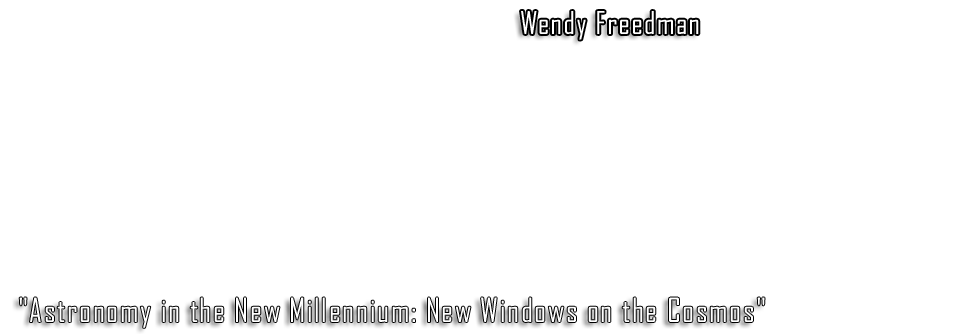2008 Brinson Lecture: "Astronomy in the New Millennium: New Windows on the Cosmos"
Thursday, October 2, 2008 @ 7:00 PM | Assembly Hall, Thompson Center 100 W Randolph St
Join Dr. Freedman, the inaugural Brinson Lecturer at The University of Chicago, for an exciting evening exploring the forefronts of astronomy, as we prepare to mark the 400th anniversary of when Galileo Galilei first turned a telescope to the sky. In the last few decades alone, we have discovered about 300 new planets outside of those in our own Solar System, detected massive black holes, and observed the entire universe to be expanding at an increasing rate, pulled apart by a cosmic force, unexplained by any of our current physical theories. Dr. Freedman will focus on recent astronomical discoveries, and show how giant new telescopes planned for both the ground and space will address some of the biggest mysteries in astronomy today.
Wendy Freedman, 2008 Brinson Lecturer
Wendy L. Freedman, the Director of the Carnegie Observatories, grew up in Toronto, Canada, and received her BSc (1979), MS (1980), and PhD (1984) in astronomy and astrophysics from the University of Toronto. Her early work focused on the formation of stars, and the study of Cepheids, extremely bright stars whose fluctuating luminosity can be used to accurately determine distances between objects in space. This work led to her leadership role with the Hubble Space Telescope Key Project on the Extragalactic Distance Scale, which used Cepheid stars to measure the rate of the universe's expansion.
In 1984, Freedman joined the Observatories of the Carnegie Institution in Pasadena, California, as a postdoctoral fellow. Three years later, she became a faculty member there - the first woman to join the Observatories' permanent scientific staff. In March 2003, she was named the Crawford H. Greenewalt Chair and Director of the Carnegie Observatories.
Freedman has received many honors for her studies of galactic evolution and the evolution of stellar populations of galaxies, as well as for her leadership in bringing observational cosmology into the 21st century. These awards include the American Philosophical Society's Magellanic Premium Award (2002), the Royal Astronomical Society's George Darwin Lectureship (2001), and the Cosmos Club Foundation's John P. McGovern Award in Science (2000). She was elected to the American Academy of Arts and Sciences in 2000, the National Academy of Sciences in 2003 and to the American Philosophical Society in 2007.
In 1984, Freedman joined the Observatories of the Carnegie Institution in Pasadena, California, as a postdoctoral fellow. Three years later, she became a faculty member there - the first woman to join the Observatories' permanent scientific staff. In March 2003, she was named the Crawford H. Greenewalt Chair and Director of the Carnegie Observatories.
Freedman has received many honors for her studies of galactic evolution and the evolution of stellar populations of galaxies, as well as for her leadership in bringing observational cosmology into the 21st century. These awards include the American Philosophical Society's Magellanic Premium Award (2002), the Royal Astronomical Society's George Darwin Lectureship (2001), and the Cosmos Club Foundation's John P. McGovern Award in Science (2000). She was elected to the American Academy of Arts and Sciences in 2000, the National Academy of Sciences in 2003 and to the American Philosophical Society in 2007.
This event is sponsored by the University of Chicago
This event is made possible by a generous gift from the Brinson Foundation to the University of Chicago.
This event is made possible by a generous gift from the Brinson Foundation to the University of Chicago.






